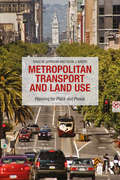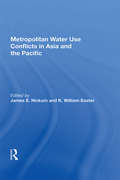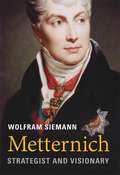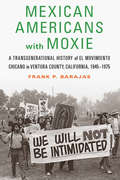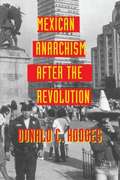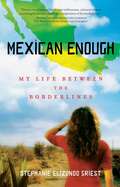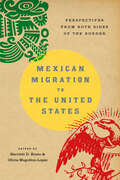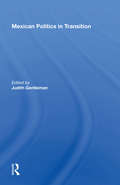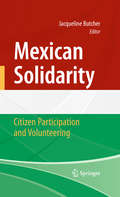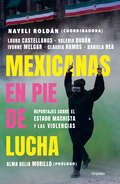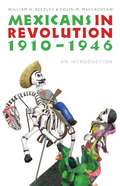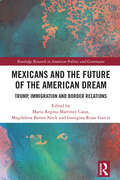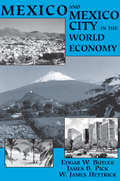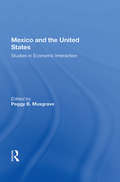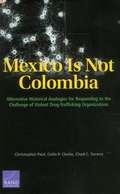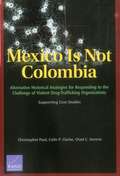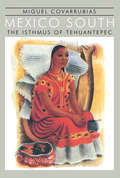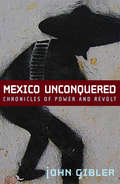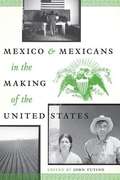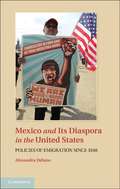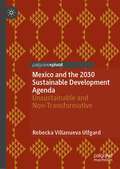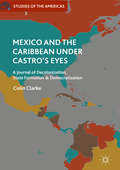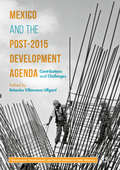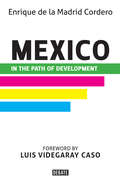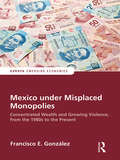- Table View
- List View
Metropolitan Transport and Land Use: Planning for Place and Plexus
by David M Levinson Kevin J KrizekAs cities around the globe respond to rapid technological changes and political pressures, coordinated transport and land use planning is an often targeted aim. Metropolitan Transport and Land Use, the second edition of Planning for Place and Plexus, provides unique and updated perspectives on metropolitan transport networks and land use planning, challenging current planning strategies, offering frameworks to understand and evaluate policy, and suggesting alternative solutions. The book includes current and cutting-edge theory, findings, and recommendations which are cleverly illustrated throughout using international examples. This revised work continues to serve as a valuable resource for students, researchers, practitioners, and policy advisors working across transport, land use, and planning.
Metropolitan Water Use Conflicts In Asia And The Pacific
by K. William Easter James E. NickumAlthough Asia is the least urbanized continent, it contains half of the world’s megacities and many of the world’s fastest-growing economies. Urban growth is already stressing local water supplies and causing intense conflict among water users—between haves and have-nots in urban areas as well as between farmers and fishers outside the cities. In addition, concern is growing over the depletion and degradation of water sources and over the impact of water policies and patterns of water use on the natural environment. From the perspective of the maturing metropolitan water economy, the contributors to this volume consider the problems of urban water management in the region. They focus on the institutional and policy dimensions of conflict and seek to provide a range of viable options for reducing the growing frictions among water users. Eight specific case studies of urban areas in Asia and the Pacific span a wide range of economic levels of development, physical settings, and hydrological conditions. The book will be of interest to scholars and policymakers concerned with issues of water and environmental policy, urban management, and resource conflict in general.
Metternich: Strategist and Visionary (Beck'sche Reihe - Band 2484 Ser.)
by Wolfram SiemannWolfram Siemann tells a new story of Clemens von Metternich, the Austrian at the center of nineteenth-century European diplomacy. Known as a conservative and an uncompromising practitioner of realpolitik, in fact Metternich accommodated new ideas of liberalism and nationalism insofar as they served the goal of peace. And he promoted reform at home.
Mexican Americans with Moxie: A Transgenerational History of El Movimiento Chicano in Ventura County, California, 1945–1975
by Frank P. BarajasIn Mexican Americans with Moxie Frank P. Barajas argues that Chicanas and Chicanos of the 1960s and 1970s expressed politics distinct from the Mexican American generation that came of age in the decades prior. Barajas focuses on the citrus communities of Fillmore and Santa Paula and the more economically diversified and populated rurban municipalities of Oxnard, Simi Valley, and Ventura, illustrating Ventura County&’s relationship to Los Angeles and El Movimiento&’s ties to suburbanization, freeway construction, and the rise of a high-tech and defense-industry corridor. Mexican Americans with Moxie devotes particular attention to cross-cultural dynamics that transcended space and generation. The residents of Ventura County became involved with national issues such as the Vietnam War, school desegregation, labor, and electoral politics. The actions of Black students at the community colleges of Moorpark and Ventura and other area universities inspired Mexican American youth of Ventura County to assess their own activism.Mexican Americans with Moxie situates the Chicana-Chicano movement within the nation&’s struggle to achieve social justice. From this history, readers will gain a new appreciation for how leadership development spans generations and contributes to the identity formation of communities.
Mexican Anarchism after the Revolution
by Donald C. HodgesFormal anarchist organizations disappeared in Mexico after the 1910 Revolution, but anarchist principles survive in the popular resistance movements against the post-revolutionary governments. In this book, Donald Hodges offers the first comprehensive treatment of the intellectual foundations, history, politics, and strategy of Mexican anarchism since the Revolution.
Mexican Enough: My Life Between the Borderlines
by Stephanie Elizondo GriestGrowing up in a half-white, half-brown town and family in South Texas, Stephanie Elizondo Griest struggled with her cultural identity. Upon turning thirty, she ventured to her mother's native Mexico to do some root-searching and stumbled upon a social movement that shook the nation to its core. Mexican Enough chronicles her adventures rumbling with luchadores (professional wrestlers), marching with rebel teachers in Oaxaca, investigating the murder of a prominent gay activist, and sneaking into a prison to meet with indigenous resistance fighters. She also visits families of the undocumented workers she befriended back home. Travel mates include a Polish thief, a Border Patrol agent, and a sultry dominatrix. Part memoir, part journalistic reportage,Mexican Enough illuminates how we cast off our identity in our youth, only to strive to find it again as adults -- and the lessons to be learned along the way.
Mexican Migration to the United States: Perspectives From Both Sides of the Border
by Harriet D. RomoThis anthology examining borderlands migration brings together the perspectives of Mexican and US scholars from a variety of fields. Gathering a transnational group of prominent researchers, including leading Mexican scholars whose work is not readily available in the United States, this collection brings together an array of often-overlooked viewpoints, reflecting the interconnectedness of immigration policy. These essays reveal significant aspects of labor markets, family life, and educational processes. They capture the evolving legal frameworks and economic implications of Mexico-US migrations at the national and municipal levels, as well as the experiences of receiving communities in the United States. The volume includes illuminating reports on populations ranging from undocumented young adults to elite Mexican women immigrants, health-care rights, Mexico&’s incorporation of return migration, the impact of Deferred Action for Childhood Arrivals on higher education, and the experiences of young children returning to Mexican schools after living in the United States. Reflecting a multidisciplinary approach, the list of contributors includes anthropologists, demographers, economists, educators, policy analysts, and sociologists. Underscoring the fact that Mexican migration to the United States is unique and complex, this timely work exemplifies the cross-border collaboration crucial to the development of immigration policies that serve people in both countries.
Mexican Politics In Transition
by Judith GentlemanInitiated in the mid-1970s, Mexico's program of political reform was designed to provide a new opportunity for political competition. In this book, contributors examine the significance political mobilization has had and the extent to which the reform has served as a vehicle for defusing discontent in the wake of Mexico's failed oil-based developme
Mexican Solidarity
by Jacqueline ButcherThis book offers a new look at Mexican civil society, through a rigorous quantitative and qualitative analysis of volunteering in Mexico. The findings of this study, with new methodologies specifically tailored to the unique nature of Mexican volunteerism contradict previous studies that considered Mexico's Third Sector one of the smallest and least developed worldwide. American or European models of studying the Third Sector do not accurately translate to the study of Mexico, and the author of this key volume has developed a new and important model of study. The results of this study will provide key insights about the growing Third Sector in Mexico, including: the concept of volunteering in Mexico, case studies of Non-Profit Organizations in Mexico, findings, Challenges, and Implications of this Study, detailed outline of the Methodology, technological Support for Information Gathering. The results and methodology of this groundbreaking study will be invaluable not only to researchers studying the Third Sector in Mexico, but those studying other analogous cultures that do not fit into traditional American or European models.
Mexicanas en pie de lucha: Pese al gobierno machista, las violencias y el patriarcado
by Laura Castellanos Valeria Durán Daniela Rea Nayeli Roldán Claudia Ramos Ivonne MelgarA menudo pienso que ese “si tocan a una, respondemos todas” entraña una verdad perturbadora, es así porque todas o casi —nueve de cada diez, dirán las estadísticas— hemos sufrido algún tipo de violencia. ¿O de qué tamaño es el espectro de lo que no vemos, de lo que aún no se ha contado? ¿Cuántas historias caben entre la de esa anciana que camina encorvada por las calles, con el cuerpo roto por su marido y Fátima, la niña de doce años que no pudo recoger su premio de declamación de poesía? —alma delia murillo El ESTADO MACHISTA y sus decisiones, el covid-19, la crisis económica subsecuente y la violencia brutal se han ensañado con las mexicanas. Ante esto, la palabra y la sororidad, los datos irrefutables, la explicación, la inteligencia y el diálogo son sus armas. En esta obra, seis periodistas de primer nivel —coordinadas por Nayeli Roldán, ganadora del premio Ortega y Gasset y del Premio Nacionalde Periodismo 2018— ofrecen reportajes que retratan, con sensibilidad combativa, la situación actual de las mujeres, las consecuencias de las políticas públicas vigentes, el estado de las luchas feministas y los escenarios que se avizoran.
Mexicans In Revolution, 1910-1946: An Introduction
by William H. Beezley Colin M. MaclachlanOn November 20, 1910, Mexicans initiated the world's first popular social revolution. The unbalanced progress of the previous regime triggered violence and mobilized individuals from all classes to demand social and economic justice. In the process they shaped modern Mexico at a cost of two million lives. This accessible and gripping account guides the reader through the intricacies of the revolution, focusing on the revolutionaries as a group and the implementation of social and political changes. In this volume written for the revolution's centennial, William H. Beezley and Colin M. MacLachlan recount how the revolutionary generation laid the foundation for a better life for all Mexicans.
Mexicans and the Future of the American Dream: Trump, Immigration and Border Relations (Routledge Research in American Politics and Governance)
by Maria Regina Martínez Casas Magdalena Barros Nock Georgina Rojas GarcíaMexicans and the Future of the American Dream examines the lives of Mexican society and government officials in the United States. The 2016 U.S. Presidential election marked a defining moment in the lives of Mexicans in the United States. It rekindled nightmares in many Mexicans and pitted a new generation of Mexicans and Mexican Americans against a shift in politics. In this book, national experts and former government officials explore the direction and magnitude of Donald J. Trump’s shifts in immigration policy in three areas: consular strategies put in motion after the election, drugs, and bilateral relations. Insights from nineteen Mexican consulates throughout the U.S. territory, in states both favorable and against immigration, demonstrate shifting perspectives of government officials and that of Mexicans visiting consulates for formalities, getting orientation on a range of topics, or just to asking for help. Mexicans and the Future of the American Dream will be of interest to advanced students and researchers of Politics, Sociology, History, Ethnic Studies and American Studies.
Mexico And Mexico City In The World Economy
by Edgar W ButlerTo understand contemporary Mexico, it is absolutely necessary to examine its level of development, and its relationship with the rest of the world. The level of development will, most likely, be related to the world system network, although the concepts are not identical. In Understanding Mexico and Mexico City in the World Economy, the authors aim to determine Mexico's level of development, and how Mexico fits into the world system.Through their research, the authors provide outcomes that will develop a more refined world systems approach. The book features cluster analyses of Mexican economic development levels, sector case studies including specific spatial analyses and maps of trends in Mexico, a systematic theoretic framework encompassing levels of the world, national, and local areas, and recent data presented through maps, tables, charts, and statistical summaries. The text will prove to be useful and practical for researchers, academics, and others interested in Mexico and its international linkages.
Mexico And The U.s.: Studies In Economic Interaction
by Peggy B. MusgraveThe future of the Mexican economy is highly dependent on the health and vitality of its larger neighbor, the United States. But the dependence is mutual: Mexico is an important trade partner of the United States and a vital link in its relations with other Latin American countries. Contributors to this volume address the key issues of economic inte
Mexico Is Not Colombia: Alternative Historical Analogies for Responding to the Challenge of Violent Drug-Trafficking Organizations
by Christopher Paul Colin P. Clarke Chad C. SerenaDespite the scope of the threat they pose to Mexico's security, violent drug-trafficking organizations are not well understood, and optimal strategies to combat them have not been identified. While there is no perfectly analogous case from history, Mexico stands to benefit from historical lessons and efforts that were correlated with improvement in countries facing similar challenges related to violence and corruption.
Mexico Is Not Colombia: Alternative Historical Analogies for Responding to the Challenge of Violent Drug-Trafficking Organizations, Supporting Case Studies
by Christopher Paul Colin P. Clarke Chad C. SerenaDespite the scope of the threat they pose to Mexico's security, violent drug-trafficking organizations are not well understood, and optimal strategies to combat them have not been identified. While there is no perfectly analogous case to Mexico's current security situation, historical case studies may offer lessons for policymakers as they cope with challenges related to violence and corruption in that country.
Mexico South
by Miguel CovarrubiasThis book deals with the modern, northern half of the Isthmus, its social struggles and its varied problems in adapting a backward region to the need and ways of industrial civilization. It presents a view of the modern Isthmus Zapotecs, living around Juchitan and Tehuantepec.
Mexico Unconquered: Chronicles of Power and Revolt
by John GiblerMexico Unconquered is an evocative report on the powers of violence and corruption in Mexico and the rebel underdogs who put their lives on the line to build justice from the ground up. Mexico Unconquered probes the overwhelming divisions in contemporary Mexico, home to the world's richest man, Carlos Slim, and to destitute millions. John Gibler weaves narrative journalism with lyrical descriptions, combining the journalist's trade of walking the streets and the philosopher's task of drawing out the tremendous implications of the seemingly mundane. John Gibler has reported for In These Times, Common Dreams, YES! Magazine, ColorLines, and Democracy Now!.
Mexico and Mexicans in the Making of the United States
by John TutinoMexico and Mexicans have been involved in every aspect of making the United States from colonial times until the present. Yet this shared history is a largely untold story, eclipsed by headlines about illegal immigration and the drug war. Placing Mexicans and Mexico in the centre of American history, this volume elucidates how economic, social, and cultural legacies grounded in colonial New Spain shaped both Mexico and the United States, as well as how Mexican Americans have constructively participated in North American ways of production, politics, social relations, and cultural understandings. Combining historical, sociological, and cultural perspectives, the contributors to this volume explore the following topics: the Hispanic foundations of North American capitalism; indigenous peoples' actions and adaptations to living between Mexico and the United States; U. S. literary constructions of a Mexican "other" during the U. S. -Mexican War and the Civil War; the Mexican cotton trade, which helped sustain the Confederacy during the Civil War; the transformation of the Arizona borderlands from a multiethnic Mexican frontier into an industrializing place of "whites" and "Mexicans"; the early-twentieth-century roles of indigenous Mexicans in organizing to demand rights for all workers; the rise of Mexican Americans to claim middle-class lives during and after World War II; and the persistence of a Mexican tradition of racial/ethnic mixing - mestizaje - as an alternative to the racial polarities so long at the centre of American life.
Mexico and its Diaspora in the United States
by Alexandra DelanoIn the past two decades, changes in the Mexican government's policies toward the 30 million Mexican migrants living in the US highlight the importance of the Mexican diaspora in both countries given its size, its economic power and its growing political participation across borders. This work examines how the Mexican government's assessment of the possibilities and consequences of implementing certain emigration policies from 1848 to 2010 has been tied to changes in the bilateral relationship, which remains a key factor in Mexico's current development of strategies and policies in relation to migrants in the United States. Understanding this dynamic gives an insight into the stated and unstated objectives of Mexico's recent activism in defending migrants' rights and engaging the diaspora, the continuing linkage between Mexican migration policies and shifts in the US-Mexico relationship, and the limits and possibilities for expanding shared mechanisms for the management of migration within the NAFTA framework.
Mexico and the 2030 Sustainable Development Agenda: Unsustainable and Non-Transformative (Governance, Development, and Social Inclusion in Latin America)
by Rebecka Villanueva UlfgardThis book explores how and why Mexico’s approach to the 2030 Agenda for Sustainable Development and Sustainable Development Goals (SDG) implementation with the López Obrador administration is unsustainable and non-transformative, overshadowed by his vision of Mexico’s “Fourth Transformation”. Approached as a super mantra revolving around “Republican Austerity” and “First, the poor”, it provides original analysis of structural and conjunctural challenges facing Mexico as regards People-, Planet-, and Peace-centered development. The book reveals the promise “First, the poor” is inconsistent with data on Mexico’s poverty reduction (SDG1). Despite record-high spending on social programs and unmatched coverage, the recent tendency of improvement in tackling poverty is rather ambiguous from the perspective of multidimensional poverty. The book covers access to clean energy (SDG7), resilient infrastructure and sustainable industrialization (SDG9), and safeguarding biodiversity (SDG15) by examining three megaproject case studies: the oil refinery Dos Bocas, the Interoceanic Corridor of the Isthmus of Tehuantepec, and the Maya Train, generating concern with the economic, environmental, and social dimensions of sustainable development. The prospects for an ‘enabling environment’ for SDG implementation are hampered by persistently high levels of homicides and impunity (SDG16). Turning Mexico’s Armed Forces into ‘first development partner of choice’ is problematized as regards their reach in infrastructure megaprojects and social welfare programs, in the overall context of the ‘de-risking state’ favoring private capital. The result, as determined by Villanueva Ulfgard, has led Mexico further astray from sustainable and transformative development.
Mexico and the Caribbean Under Castro's Eyes: A Journal of Decolonization, State Formation and Democratization (Studies of the Americas)
by Colin ClarkeThis book provides a first-hand account of the author’s encounters as a social geographer, based on his field research and travels in Mexico and the Caribbean. The interlocutors of different classes and races introduce the reader to a variety of urban and rural communities, many of them involved in development projects. Two leitmotifs of the 1960s and 1970s recur throughout the volume: decolonization, state formation, and the quest for democracy in the post-colonial societies of Mexico and the Caribbean; and the conditions which were likely to constrain or challenge these developments, quintessentially associated with the 1959 Cuban revolution, the cold war and student radicalism.
Mexico and the Post-2015 Development Agenda
by Rebecka Villanueva UlfgardThis interdisciplinary edited collection presents original analysis on Mexico's transition from the Millennium to the Sustainable Development Goals, departing from three main perspectives. In what areas did Mexico gain leverage and actually contribute to the debate around the proposed SDGs? What are the challenges for Mexico with regard to the SDGs? How to handle the issue of congruence/dissonance in Mexico's accomplishment of the MDGs in relation to the socioeconomic realities on the ground? The contributing authors examine what kind of state is needed to strengthen democratic politics and social justice, but also to improve the economic effectiveness of the state and thereby prospects for development. For Mexico, what is missing is a clear vision for creating a progressive, truly modern society where the notion of a social contract between the government and citizens could be established along the lines of a welfare state that is inclusive, sustainable, and transformative enough to tackle seriously the fundamental socioeconomic injustices dividing Mexicans.
Mexico in the Path of Development
by Enrique de la Madrid CorderoEnrique de la Madrid Cordero analyses Mexico's economic growth over the last three decades and the historic opportunity for eliminating its barriers to growth and aspiring to becoming a developed country.Foreword by Luis Videgaray Caso."Mexico is blessed with a wealth of strengths and comparative advantages, placing it among the countries with the highest growth potential in the twenty-first century. Furthermore, this country has achieved a series of fundamental goals over the years, clearly shown by indicators on education, health, employment, housing and infrastructure, to name only a few.However, despite its strengths and achievements, Mexico's economic growth over the last three decades has been inconsistent and unspectacular; especially considering its potential and the need to end the poverty lived by almost half of all Mexicans.Three elements have caused Mexico's low economic growth: a lack of financial penetration, a shortfall in economic competition and low productivity. These elements have also led to the country's inadequate and unequal distribution of wealth.Today, a favorable international context and a process of profound internal reforms promoted by President Enrique Peña Nieto within the "Pacto por México", Mexico is on the brink of a historic opportunity for eliminating its barriers to growth and aspiring to becoming a developed country within this generation."Enrique de la Madrid
Mexico under Misplaced Monopolies: Concentrated Wealth and Growing Violence, from the 1980s to the Present (Europa Perspectives: Emerging Economies)
by Francisco E. GonzalezMexicans and those who follow Mexican affairs were optimistic in 2000 when the country experienced its first alternation in government (from the Partido Revolucionario Institucional –PRI--to the Partido Acción Nacional--PAN) in more than 70 years. Moreover, the Mexican economy had been restructured in a more open, market-led direction in the course of the 1980s and 1990s. The outcomes of these dual transitions were expected to create a new type of politics that were representative and accountable to citizens, and an economy that would grow rapidly, as it was forced to modernize by facing international competition. Some two decades later, views about Mexico are much less sanguine, and for many the country continues to follow a bipolar politico-economic trajectory characterized by periods of enthusiasm and mania which are followed by crisis and depression. This book presents a new analytical framework and reviews in detail Mexico’s political and economic history since the 1980s. The explanation offered is based on the idea of ‘misplaced monopolies’--i.e. an open political regime but a weak, fragmented state, and an internationally open economy, but highly concentrated economic sectors and activity in the domestic sphere. Accordingly, sown in the course of the crisis-ridden 1980s and 1990s, misplaced monopolies grew roots and became core features of Mexico’s political economy in the 2000s and 2010s. The end result has been great concentration of wealth in a small number of hands, and the dramatic growth in brutal violence in many parts of the country. From this perspective, unless ‘misplaced monopolies’ are reversed, conditions will remain prone to crisis, polarization, and conflict in Mexico. This volume concludes by extrapolating the framework and placing Mexico in comparative perspective, alongside internationally important countries such as Brazil, China, India, and Russia. This is a highly original investigation that will interest people who follow Mexican politics and its economy. The analytical framework will be of use to analysts, scholars, and students of comparative political economy, democratization studies, market reforms, and security and conflict studies.
